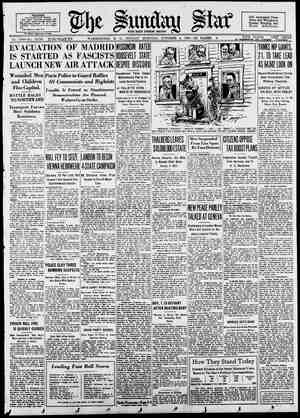Evening Star Newspaper, October 4, 1936, Page 88
You have reached the hourly page view limit. Unlock higher limit to our entire archive!
Subscribers enjoy higher page view limit, downloads, and exclusive features.
TURN ABOU Jenk missed his chance for the last laugh — well, every man’'s a fool sometime! T was a long time since the Coon Club had hunted coons. Nevertheless, in the fall of the year, coons often attended the weekly dinner as honored — and relished — guests. Will Morley, who was president of the Club and also cook, could play a symphony on any available raw materials, but roast coon was the program tonight, so there was a full at- tendance. While the coon was roasting, half a dozen men were playing railroad pitch, Jenk Dowel and Bob Eyer among them. Jenk was a careful, canny man. He had an automobile agency; and his narrow allowances on used cars were a public scandal. Bob's barn was stocked with odds and ends bought because they were cheap, waiting till he could find a market for them. He took loss as cheerfully as gain. Jenk took a gain as grimly as a loss, though there might, when he prospered, be a malicious satisfaction in his ¢yes. Bob preferred to buy from willing sellers, sell to pleased purchasers. Jenk grasped a profit greedily, whether the other party to the transaction was contented with his trade or not. Naturally he and Jenk were hope- lessly at odds — and more so than ever since Nancy Freeman had come home from college four or five months before. Before dinner was ready, Nate Decker came in. Nate was teller in the East Harbor Na- tional Bank, which was in the act of making extensive repairs on the bank building, in- volving a new vault, new furniture, and a new wing in the rear. The discarded equipment had been advertised for sale, and Doc Fillmore BOB PUT THE MOTORBOAT TO Magazine Section . THIS WEEK . An amusing story by BeENn AMES WILLIAMS asked the newcomer now: ‘‘When's the auction, Nate?"” ‘““Tomorrow afternoon. Chance for anyone that needs it to get some office stuff cheap; and anybody that wants a forty-ton safe . . . "’ Then Will Morley called them to table; and the coon went the way of well-roasted coons. Afterward, a poker game began. Coon Club poker games have one feature not found else- where. As often as not, when betting is ended and before the showdown, someone will say: ‘“‘How’ll you dicker?’’ And there may follow offer and counter offer. *‘I'll give you the red chips.” “‘I'll let you take your money out.” Or: “I'll split the pot with you."” Jenk Dowel resented these interludes with a ravenous wrath; but dickering was part of the game to the rest of them. Particularly Bob Eyer. To persuade a man who held three deuces to split the pot with him, when his own hold- ing was a busted flush, gave him a pleasure far beyond winning a big pot with a valid hand. Tonight, as the game proceeded, Jenk played as warily as always; and he waited maliciously for that occasion of which he dreamed, waited for the time when he should hold a big hand in a pot where Bob and Doc Fillmore started one of their jovial raising bees. Tonight the dream came true. Doc Fillmore opened on his right. GOOD USE — TOO GOOD, JENK THOUGHT lllustration by Williom Reusswig BOB WAS LOAL Jenk looked at his own cards and his pulse pounded. But he merely stayed —and Bob raised! So did Doc! Jenk, artistically grumbling, stayed along. Bob exulted: ‘“Well, Doc, we've got Jenk be- tween us! Let's give him a ride. Up a dime.”” * | ‘“‘And a dime,"” Doc jovially agreed. Raise, raise, raise, Jenk still protesting. They drew cards. Doc took two, Jenk was pat, Bob took one. Doc bet, Jenk stayed, Bob raised. Raise, raise, raise. At last the hand was called. Bob asked: “Doc, how'll you dicker?" #‘Give you the white ones.” “‘Give you the white ones,”’ Bob countered. They ignored Jenk; but now Jenk said: “‘Hold on. If you want to dicker, I'll give you each fifty cents and let you out."” “‘Shucks,"”” Bob retorted. ‘‘I'll do better than that. I'll give you a dollar, Jenk. No, two dollars. That'll leave you a pmfit. Better take L,' “Give you fifty cents apiece,” Jenk in- sisted; and Doc Fillmore surrendered suddenly : “I'll just take that, Jenk! I didn't help mine!" Jenk paid him, cash. ‘‘How about you, Bob?"’ he challenged. Bob decided: *‘I guess my two pair are good enough to win.” He laid down his cards, face up, but without spreading them; and dragged the chips toward him. But Jenk said, prolonging his triumph, ‘Hold on, Bob. I picked up a pat straight, myself."” “That’s all right,” Bob assured him, grin- ning. ‘‘My two pair happen to be Jacksover ° Jacks.” And Jenk retorted, his hatred of the other for once patent in his eyes: ‘‘Why, that's real int'resting, because you see my little straight happens to be all spades!"’ Jenk lay long awake that night, relishing that moment, remembering Bob's blank as- tonishment, and the roar of laughter at Bob’s expense, and Bob's red, angry face. It was an intoxicating memory; Jenk was not wholly free - I
